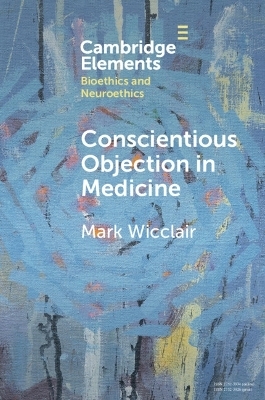
Conscientious Objection in Medicine
Seiten
2024
Cambridge University Press (Verlag)
978-1-009-07479-7 (ISBN)
Cambridge University Press (Verlag)
978-1-009-07479-7 (ISBN)
This Element provides a strong focus on enactive theory and the prospects for integrating enactive approaches with other embodied and extended theories, mediated through recent developments in predictive processing and the free energy principle.
The Element examines ethical and conceptual issues about conscientious objection in medicine. Concepts analyzed include conscientious objection, conscientious provision, conscience, moral complicity, and moral integrity. Several ongoing ethical controversies are identified and critically analyzed. One is a disagreement about whether conscientious objection is compatible with physicians' professional obligations. The Element argues that incompatibilists fail to offer a justifiable specification of professional obligations that supports their position. The Element also argues that a challenge for compatibilists who support a reason-giving requirement is to specify justifiable and unambiguous criteria for reviewing objectors' reasons. Arguments for and against requirements to inform and refer patients are critically analyzed, and an alternative, context-dependent requirement is offered. Another subject of controversy is about the justifiability of asymmetry between responses to conscientious objectors and conscientious providers. Typically, only the former receive accommodation. The Element critically examines arguments for asymmetry and maintains that none provides a convincing justification.
The Element examines ethical and conceptual issues about conscientious objection in medicine. Concepts analyzed include conscientious objection, conscientious provision, conscience, moral complicity, and moral integrity. Several ongoing ethical controversies are identified and critically analyzed. One is a disagreement about whether conscientious objection is compatible with physicians' professional obligations. The Element argues that incompatibilists fail to offer a justifiable specification of professional obligations that supports their position. The Element also argues that a challenge for compatibilists who support a reason-giving requirement is to specify justifiable and unambiguous criteria for reviewing objectors' reasons. Arguments for and against requirements to inform and refer patients are critically analyzed, and an alternative, context-dependent requirement is offered. Another subject of controversy is about the justifiability of asymmetry between responses to conscientious objectors and conscientious providers. Typically, only the former receive accommodation. The Element critically examines arguments for asymmetry and maintains that none provides a convincing justification.
1. Introduction; 2. What is conscientious objection?; 3. Should conscientious objectors be accommodated?; 4. Assessing objectors' beliefs and reasons; 5. Accommodation and conscientious provision; 6. Conclusion; Notes; References.
| Erscheinungsdatum | 29.03.2024 |
|---|---|
| Reihe/Serie | Elements in Bioethics and Neuroethics |
| Zusatzinfo | Worked examples or Exercises |
| Verlagsort | Cambridge |
| Sprache | englisch |
| Themenwelt | Geisteswissenschaften ► Psychologie ► Entwicklungspsychologie |
| Medizin / Pharmazie ► Medizinische Fachgebiete ► Medizinethik | |
| Studium ► Querschnittsbereiche ► Geschichte / Ethik der Medizin | |
| Naturwissenschaften ► Biologie | |
| Sozialwissenschaften ► Soziologie | |
| ISBN-10 | 1-009-07479-2 / 1009074792 |
| ISBN-13 | 978-1-009-07479-7 / 9781009074797 |
| Zustand | Neuware |
| Informationen gemäß Produktsicherheitsverordnung (GPSR) | |
| Haben Sie eine Frage zum Produkt? |
Mehr entdecken
aus dem Bereich
aus dem Bereich
Die Geschichte eines Weltzentrums der Medizin von 1710 bis zur …
Buch | Softcover (2021)
Lehmanns Media (Verlag)
17,95 €
von der Antike bis zur Gegenwart
Buch | Softcover (2024)
C.H.Beck (Verlag)
12,00 €
Krankheitslehren, Irrwege, Behandlungsformen
Buch | Softcover (2024)
C.H.Beck (Verlag)
39,95 €


